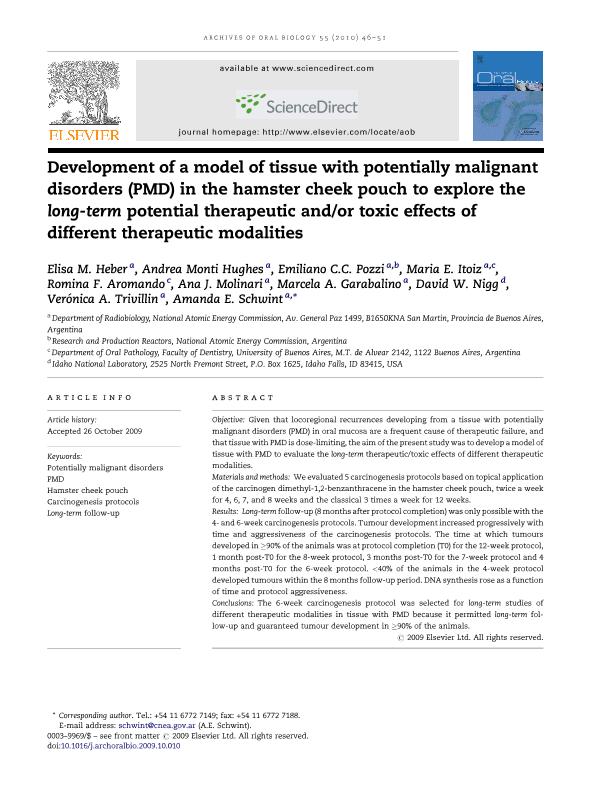Artículo
Development of a model of tissue with potentially malignant disorders (PMD) in the hamster cheek pouch to explore the long-term potential therapeutic and/or toxic effects of different therapeutic modalities
Heber, Elisa Mercedes; Monti Hughes, Andrea ; Pozzi, Emiliano César Cayetano; Itoiz, María Elina
; Pozzi, Emiliano César Cayetano; Itoiz, María Elina ; Aromando, Romina Flavia; Molinari, Ana Julia
; Aromando, Romina Flavia; Molinari, Ana Julia ; Garabalino, Marcela Alejandra; Nigg, David W.; Trivillin, Verónica Andrea
; Garabalino, Marcela Alejandra; Nigg, David W.; Trivillin, Verónica Andrea ; Schwint, Amanda Elena
; Schwint, Amanda Elena
 ; Pozzi, Emiliano César Cayetano; Itoiz, María Elina
; Pozzi, Emiliano César Cayetano; Itoiz, María Elina ; Aromando, Romina Flavia; Molinari, Ana Julia
; Aromando, Romina Flavia; Molinari, Ana Julia ; Garabalino, Marcela Alejandra; Nigg, David W.; Trivillin, Verónica Andrea
; Garabalino, Marcela Alejandra; Nigg, David W.; Trivillin, Verónica Andrea ; Schwint, Amanda Elena
; Schwint, Amanda Elena
Fecha de publicación:
01/2010
Editorial:
Pergamon-Elsevier Science Ltd
Revista:
Archives of Oral Biology
ISSN:
0003-9969
Idioma:
Inglés
Tipo de recurso:
Artículo publicado
Clasificación temática:
Resumen
Objective: Given that locoregional recurrences developing from a tissue with potentially malignant disorders (PMD) in oral mucosa are a frequent cause of therapeutic failure, and that tissue with PMD is dose-limiting, the aim of the present study was to develop a model of tissue with PMD to evaluate the long-term therapeutic/toxic effects of different therapeutic modalities. Materials and methods: We evaluated 5 carcinogenesis protocols based on topical application of the carcinogen dimethyl-1,2-benzanthracene in the hamster cheek pouch, twice a week for 4, 6, 7, and 8 weeks and the classical 3 times a week for 12 weeks. Results: Long-term follow-up (8 months after protocol completion) was only possible with the 4- and 6-week carcinogenesis protocols. Tumour development increased progressively with time and aggressiveness of the carcinogenesis protocols. The time at which tumours developed in ≥90% of the animals was at protocol completion (T0) for the 12-week protocol, 1 month post-T0 for the 8-week protocol, 3 months post-T0 for the 7-week protocol and 4 months post-T0 for the 6-week protocol. <40% of the animals in the 4-week protocol developed tumours within the 8 months follow-up period. DNA synthesis rose as a function of time and protocol aggressiveness. Conclusions: The 6-week carcinogenesis protocol was selected for long-term studies of different therapeutic modalities in tissue with PMD because it permitted long-term follow-up and guaranteed tumour development in ≥90% of the animals.
Archivos asociados
Licencia
Identificadores
Colecciones
Articulos(OCA HOUSSAY)
Articulos de OFICINA DE COORDINACION ADMINISTRATIVA HOUSSAY
Articulos de OFICINA DE COORDINACION ADMINISTRATIVA HOUSSAY
Articulos(SEDE CENTRAL)
Articulos de SEDE CENTRAL
Articulos de SEDE CENTRAL
Citación
Heber, Elisa Mercedes; Monti Hughes, Andrea; Pozzi, Emiliano César Cayetano; Itoiz, María Elina; Aromando, Romina Flavia; et al.; Development of a model of tissue with potentially malignant disorders (PMD) in the hamster cheek pouch to explore the long-term potential therapeutic and/or toxic effects of different therapeutic modalities; Pergamon-Elsevier Science Ltd; Archives of Oral Biology; 55; 1; 1-2010; 46-51
Compartir
Altmétricas



